Vsepr shapes and angles - Study guides, Class notes & Summaries
Looking for the best study guides, study notes and summaries about Vsepr shapes and angles? On this page you'll find 11 study documents about Vsepr shapes and angles.
All 11 results
Sort by
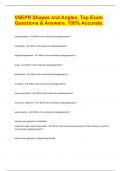
-
VSEPR Shapes and Angles, Top Exam Questions & Answers. 100% Accurate.
- Exam (elaborations) • 2 pages • 2023
-
Available in package deal
-
- $8.49
- + learn more
VSEPR Shapes and Angles, Top Exam Questions & Answers. 100% Accurate. trigonal planar - -What is this molecular shape/geometry? octahedral - -What is this molecular shape/geometry? trigonal bipyramidal - -What is this molecular shape/geometry? linear - -What is this molecular shape/geometry? tetrahedral - -What is this molecular shape/geometry? T-shaped - -What is this molecular shape/geometry? square pyramidal - -What is this molecular shape/geometry? see-saw or sawhor...
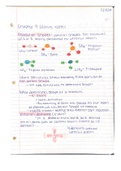
-
Chapter 9 CHEM2000 (CHEM2000) Chemistry, ISBN: 9780134414232
- Class notes • 7 pages • 2022
-
- $8.49
- + learn more
Chapter 9 covers molecular shapes (linear, nonlinear, bent, trigonal planar, t shaped, trigonal pyramidal, etc) lewis dot structures, electron domains, VSEPR theory, electron domain geometries, linear, trigonal planar, tetrahedral, nonbonding pairs and bonding angles, multiple bonds and bonding angles, beyond the octet rule, trigonal bipyramidal, octahedral, dipoles and polarity, orbital overlap, hybrid orbitals, identifying polarity
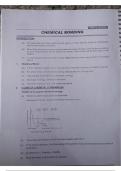
-
class notes of chemistry
- Class notes • 56 pages • 2024
-
- $7.49
- + learn more
Chemical Bonding (JEE Advanced Level) Types of Chemical Bonds Ionic Bonds Covalent Bonds Metallic Bonds Ionic Bonding Formation and Characteristics Lattice Energy Covalent Bonding Formation of Covalent Bonds Lewis Structures and Resonance Polar and Non-Polar Covalent Bonds Bond Order and Stability Hybridization Types of Hybridization (sp, sp², sp³, etc.) Geometry of Hybridized Orbitals VSEPR Theory Valence Shell Electron Pair Repulsion Theory Molecular Shapes and ...
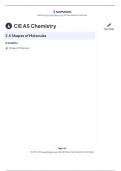
-
Shapes of Molecules
- Summary • 9 pages • 2024
- Available in package deal
-
- $2.99
- + learn more
The content discusses the shapes of molecules based on the Valence Shell Electron Pair Repulsion (VSEPR) theory. According to VSEPR, electron pairs repel each other, leading to specific molecular shapes that minimize these repulsive forces. The theory emphasizes that different types of electron pairs (bonding and lone pairs) have varying repulsion strengths, influencing the overall shape of the molecule. Key points include the dominance of lone pairs in repulsion, the identification of shapes an...
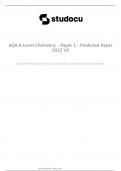
-
Paper 1 – Inorganic and Physical Chemistry Predicted Paper 2022
- Exam (elaborations) • 41 pages • 2023
-
- $9.80
- + learn more
01 ropanoic acid dissociates slightly in aqueous solution. 01.1 Write an expression for the acid dissociation constant Ka for propanoic acid. P [1 mark] …………………………………………………………………………………………………………………… …………………………………………………………………………………………………………………… 01.2 The Ka value of propanoic acid is 1.35×10-5 moldm-3. A buffer...
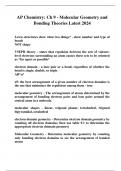
-
AP Chemistry: Ch 9 - Molecular Geometry and Bonding Theories Latest 2024
- Summary • 9 pages • 2024
-
Available in package deal
-
- $8.69
- + learn more
AP Chemistry: Ch 9 - Molecular Geometry and Bonding Theories Latest 2024 Lewis structures show what two things? - show number and type of bonds NOT shape VSEPR theory - states that repulsion between the sets of valence-level electrons surrounding an atom causes these sets to be oriented as *far apart as possible* electron domain - a lone pair or a bond, regardless of whether the bond is single, double, or triple AB*n* t/f: the best arrangement of a given number of electron domains ...
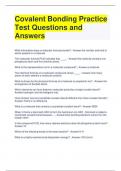
-
Covalent Bonding Practice Test Questions and Answers
- Exam (elaborations) • 3 pages • 2024
-
Available in package deal
-
- $11.49
- + learn more
Covalent Bonding Practice Test Questions and Answers What information does a molecular formula provide? - Answer-the number and kind of atoms present in a molecule The molecular formula PCl5 indicates that . - Answer-the molecule contains one phosphorus atom and five chlorine atoms What is the representative unit in a molecular compound? - Answer-a molecule The chemical formula of a molecular compound shows . - Answer-how many atoms of each element a molecule contains What is shown by t...
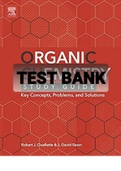
-
Exam (elaborations) TEST BANK & STUDY GUIDE FOR Organic Chemistry Study Guide, Key Concepts, Problems and Solutions By Robert J. Ouellette and J. David Rawn
- Exam (elaborations) • 598 pages • 2021
-
- $20.49
- + learn more
Atomic Structure and Properties Two periodic trends are important to understanding the physical and chemical properties of organic compounds. They are electronegativity and atomic radius. The electronegativity scale is an index of the attraction of an atom for an electron. It increases from left to right in a period and from bottom to top in a group of the periodic table. The order of electronegativities for the three most common elements in organic molecules, excluding hydrogen, is C <...
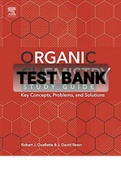
-
Exam (elaborations) TEST BANK & STUDY GUIDE FOR Organic Chemistry Study Guide, Key Concepts, Problems and Solutions By Robert J. Ouellette and J. David Rawn
- Exam (elaborations) • 598 pages • 2021
-
- $20.49
- + learn more
Atomic Structure and Properties Two periodic trends are important to understanding the physical and chemical properties of organic compounds. They are electronegativity and atomic radius. The electronegativity scale is an index of the attraction of an atom for an electron. It increases from left to right in a period and from bottom to top in a group of the periodic table. The order of electronegativities for the three most common elements in organic molecules, excluding hydrogen, is C <...
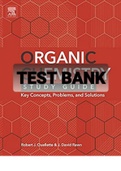
-
Exam (elaborations) TEST BANK & STUDY GUIDE FOR Organic Chemistry Study Guide, Key Concepts, Problems and Solutions By Robert J. Ouellette and J. David Rawn
- Exam (elaborations) • 598 pages • 2021
-
- $15.49
- + learn more
Exam (elaborations) TEST BANK & STUDY GUIDE FOR Organic Chemistry Study Guide, Key Concepts, Problems and Solutions By Robert J. Ouellette and J. David Rawn Organic Chemistry Study Guide, ISBN: 8644 Organic Chemistry Study Guide: Key Concepts, Problems, and Solutions Robert J. Ouellette Professor Emeritus, Department of Chemistry, The Ohio State University And J. David Rawn Professor Emeritus, Towson University AMSTERDAM • BOSTON • HEIDELBERG • LONDON • NEW YORK • OXFORD PA...

Did you know that on average a seller on Stuvia earns $82 per month selling study resources? Hmm, hint, hint. Discover all about earning on Stuvia


